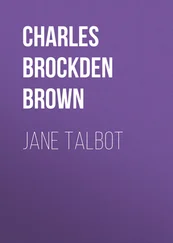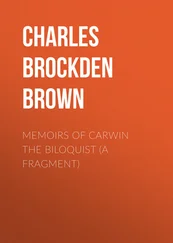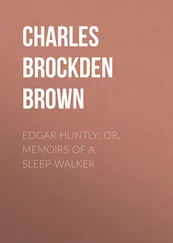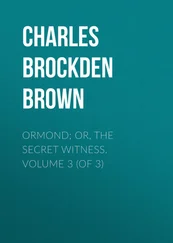Charles Brockden Brown
Published by

Books
- Advanced Digital Solutions & High-Quality eBook Formatting -
musaicumbooks@okpublishing.info
2018 OK Publishing
ISBN 978-80-272-4701-1
Preface Preface Table of Contents The following Work is delivered to the world as the first of a series of performances, which the favorable reception of this will induce the Writer to publish. His purpose is neither selfish nor temporary, but aims at the illustration of some important branches of the moral constitution of man. Whether this tale will be classed with the ordinary or frivolous sources of amusement, or be ranked with the few productions whose usefulness secures to them a lasting reputation, the reader must be permitted to decide. The incidents related are extraordinary and rare. Some of them, perhaps, approach as nearly to the nature of miracles as can be done by that which is not truly miraculous. It is hoped that intelligent readers will not disapprove of the manner in which appearances are solved, but that the solution will be found to correspond with the known principles of human nature. The power which the principal person is said to possess can scarcely be denied to be real. It must be acknowledged to be extremely rare; but no fact, equally uncommon, is supported by the same strength of historical evidence. Some readers may think the conduct of the younger Wieland impossible. In support of its possibility the Writer must appeal to Physicians and to men conversant with the latent springs and occasional perversions of the human mind. It will not be objected that the instances of similar delusion are rare, because it is the business of moral painters to exhibit their subject in its most instructive and memorable forms. If history furnishes one parallel fact, it is a sufficient vindication of the Writer; but most readers will probably recollect an authentic case, remarkably similar to that of Wieland. It will be necessary to add, that this narrative is addressed, in an epistolary form, by the Lady whose story it contains, to a small number of friends, whose curiosity, with regard to it, had been greatly awakened. It may likewise be mentioned, that these events took place between the conclusion of the French and the beginning of the revolutionary war. The memoirs of Carwin, alluded to at the conclusion of the work, will be published or suppressed according to the reception which is given to the present attempt. C. B. B. September 3, 1798.
Chapter I
Chapter II
Chapter III
Chapter IV
Chapter V
Chapter VI
Chapter VII
Chapter VIII
Chapter IX
Chapter X
Chapter XI
Chapter XII
Chapter XIII
Chapter XIV
Chapter XV
Chapter XVI
Chapter XVII
Chapter XVIII
Chapter XIX
Chapter XX
Chapter XXI
Chapter XXII
Chapter XXIII
Chapter XXIV
Chapter XXV
Chapter XXVI
Chapter XXVII
From Virtue's blissful paths away
The double-tongued are sure to stray;
Good is a forth-right journey still,
And mazy paths but lead to ill.
Table of Contents
The following Work is delivered to the world as the first of a series of performances, which the favorable reception of this will induce the Writer to publish. His purpose is neither selfish nor temporary, but aims at the illustration of some important branches of the moral constitution of man. Whether this tale will be classed with the ordinary or frivolous sources of amusement, or be ranked with the few productions whose usefulness secures to them a lasting reputation, the reader must be permitted to decide.
The incidents related are extraordinary and rare. Some of them, perhaps, approach as nearly to the nature of miracles as can be done by that which is not truly miraculous. It is hoped that intelligent readers will not disapprove of the manner in which appearances are solved, but that the solution will be found to correspond with the known principles of human nature. The power which the principal person is said to possess can scarcely be denied to be real. It must be acknowledged to be extremely rare; but no fact, equally uncommon, is supported by the same strength of historical evidence.
Some readers may think the conduct of the younger Wieland impossible. In support of its possibility the Writer must appeal to Physicians and to men conversant with the latent springs and occasional perversions of the human mind. It will not be objected that the instances of similar delusion are rare, because it is the business of moral painters to exhibit their subject in its most instructive and memorable forms. If history furnishes one parallel fact, it is a sufficient vindication of the Writer; but most readers will probably recollect an authentic case, remarkably similar to that of Wieland.
It will be necessary to add, that this narrative is addressed, in an epistolary form, by the Lady whose story it contains, to a small number of friends, whose curiosity, with regard to it, had been greatly awakened. It may likewise be mentioned, that these events took place between the conclusion of the French and the beginning of the revolutionary war. The memoirs of Carwin, alluded to at the conclusion of the work, will be published or suppressed according to the reception which is given to the present attempt.
C. B. B. September 3, 1798.
Table of Contents
I feel little reluctance in complying with your request. You know not fully the cause of my sorrows. You are a stranger to the depth of my distresses. Hence your efforts at consolation must necessarily fail. Yet the tale that I am going to tell is not intended as a claim upon your sympathy. In the midst of my despair, I do not disdain to contribute what little I can to the benefit of mankind. I acknowledge your right to be informed of the events that have lately happened in my family. Make what use of the tale you shall think proper. If it be communicated to the world, it will inculcate the duty of avoiding deceit. It will exemplify the force of early impressions, and show the immeasurable evils that flow from an erroneous or imperfect discipline.
My state is not destitute of tranquillity. The sentiment that dictates my feelings is not hope. Futurity has no power over my thoughts. To all that is to come I am perfectly indifferent. With regard to myself, I have nothing more to fear. Fate has done its worst. Henceforth, I am callous to misfortune.
I address no supplication to the Deity. The power that governs the course of human affairs has chosen his path. The decree that ascertained the condition of my life, admits of no recal. No doubt it squares with the maxims of eternal equity. That is neither to be questioned nor denied by me. It suffices that the past is exempt from mutation. The storm that tore up our happiness, and changed into dreariness and desert the blooming scene of our existence, is lulled into grim repose; but not until the victim was transfixed and mangled; till every obstacle was dissipated by its rage; till every remnant of good was wrested from our grasp and exterminated.
How will your wonder, and that of your companions, be excited by my story! Every sentiment will yield to your amazement. If my testimony were without corroborations, you would reject it as incredible. The experience of no human being can furnish a parallel: That I, beyond the rest of mankind, should be reserved for a destiny without alleviation, and without example! Listen to my narrative, and then say what it is that has made me deserve to be placed on this dreadful eminence, if, indeed, every faculty be not suspended in wonder that I am still alive, and am able to relate it. My father's ancestry was noble on the paternal side; but his mother was the daughter of a merchant. My grand-father was a younger brother, and a native of Saxony. He was placed, when he had reached the suitable age, at a German college. During the vacations, he employed himself in traversing the neighbouring territory. On one occasion it was his fortune to visit Hamburg. He formed an acquaintance with Leonard Weise, a merchant of that city, and was a frequent guest at his house. The merchant had an only daughter, for whom his guest speedily contracted an affection; and, in spite of parental menaces and prohibitions, he, in due season, became her husband.
Читать дальше













